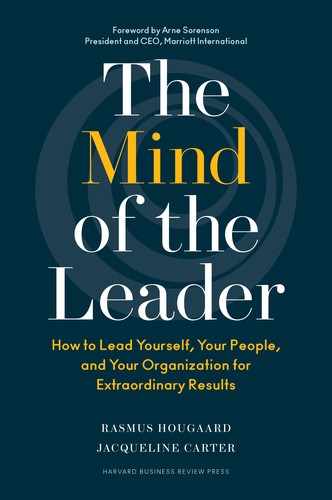PART ONE
Understand and Lead Yourself

Imagine this scenario: A researcher brings you into a room with a chair. There are no windows. No pictures. No TV. Just you and the chair. You’re asked to sit down and think. For a time ranging from six to fifteen minutes, you’ll be on your own. Could you sit and be by yourself, or might you prefer painful electric shocks as a distraction?
Astonishingly, this experiment, published in the journal Science, reported that 67 percent of men and 25 percent of women found being alone with themselves so unpleasant that they ended up self-inducing electric shocks.1 One man even shocked himself 190 times. People are so uncomfortable with their own thoughts that they’d rather have any distraction—even a physically painful one—than spend a few minutes being on their own. On the flip side, that’s how few of us have the focus, discipline, and restraint that define self-leadership. When we truly lead ourselves, it manifests itself as strength, determination, control, and balance.
Simply put, self-leadership is the ability to manage your own thoughts, behaviors, and actions. Self-leadership is the foundation for effectiveness and productivity, and for living a life according to our values and aspirations. It’s about having the mental strength to delay gratification and instead work toward long-term solutions. Self-leadership is about managing ourselves, so we can better lead our people, creating more meaning, connectedness, and a more people-centered culture.
Self-leadership starts in the mind. As an ancient Chinese proverb says, “Observe your thoughts as they become actions. Observe your actions as they become habits. And observe your habits as they shape your life.” Our minds shape our thoughts, and our thoughts shape our lives and the lives of those we lead. If we’re unable to lead our minds, then to a large degree we’re unable to lead our lives—let alone lead others.
To lay the necessary foundation for self-leadership, part 1 opens with a chapter on self-awareness. Self-awareness is the ability to monitor the mind so we can lead it better. Self-awareness is the foundation for self-leadership. We must understand our mind before we can lead it. This includes understanding how our mind works, the importance of values, and what truly makes us happy.
Chapters 3, 4, and 5 then focus on three core elements of self-leadership: mindfulness, selflessness, and compassion. Self-leadership requires focus (mindfulness), humility (selflessness), and the discipline of self-care (compassion). These three qualities—that is, MSC leadership—combine to provide a basis for effectively leading yourself—and in turn, your people—for stronger connectedness, increased happiness, and ultimately, increased productivity.
